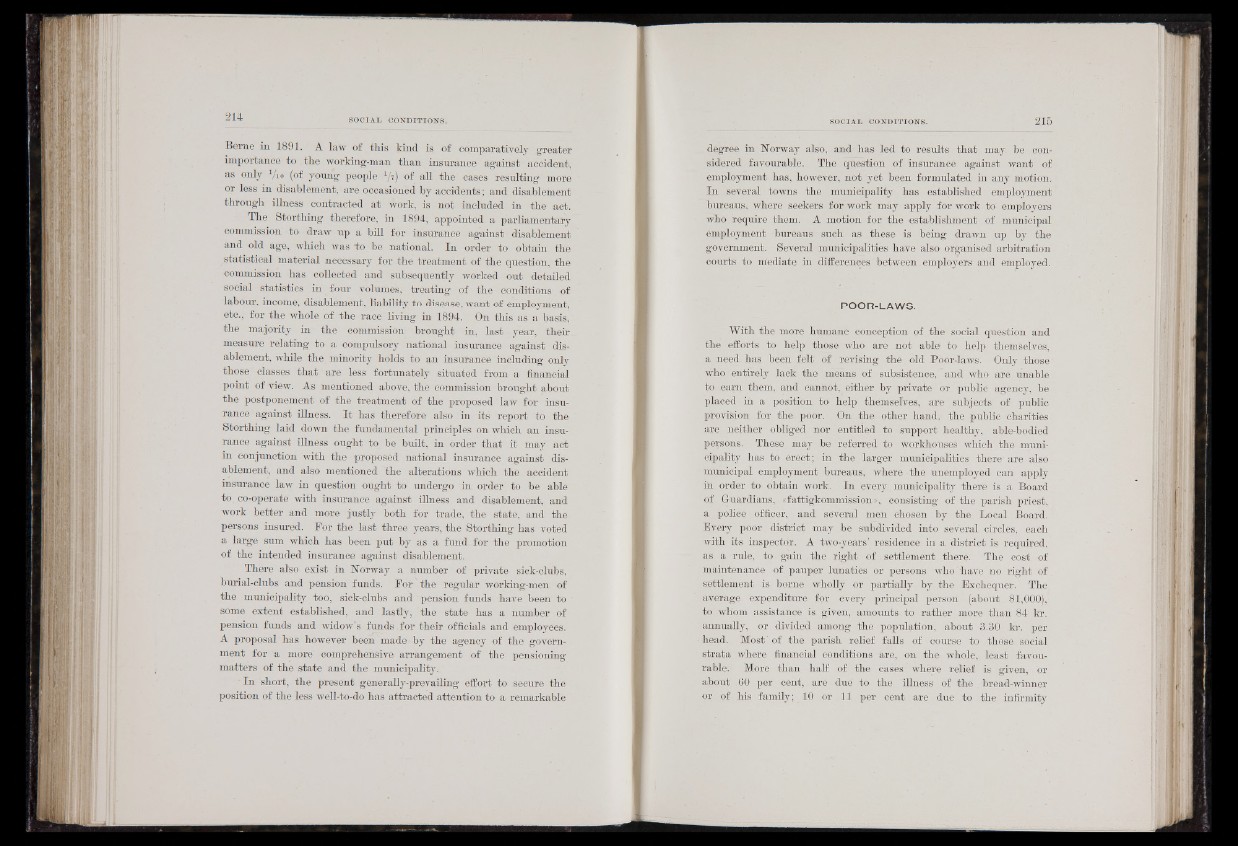
Berne in 1891. A law of this kind is of comparatively greater
importance to the working-man than insurance against accident,
as only Vio (of young people VO of all the cases resulting more
or less in disablement, are occasioned by accidents; and disablement
through illness contracted at work, is not included in the act.
The Storthing therefore, in 1894, appointed a parliamentary
commission to draw up a bill for insurance against disablement
and old age, which was to be national. In order to obtain the
statistical material necessary for the treatment of the question, the
commission has collected and subsequently worked out detailed
social statistics in four volumes,- treating of the conditions of
labour, income, disablement, liability to disease, want of employment,
etc., for the whole of the race living in 1894. On this as a basis,
the majority in the commission brought in, last year, their
measure relating to a compulsory national insurance against disablement,
while the minority holds to an insurance including only
those classes that are less fortunately situated from a financial
point of view. As mentioned above, the commission brought about
the postponement of the treatment of the proposed law for insurance
against illness. I t has therefore also in its report to the
Storthing laid down the fundamental principles on which an insurance
against illness ought to be built, in order that it may act
in conjunction with the proposed national insurance against disablement,
and also mentioned the alterations which the accident
insurance law in question ought to undergo in order to be able
to co-operate with insurance against illness and disablement, and
work better and more justly both for trade, the state, and the,
persons insured. For the last three years, the Storthing has voted
a large sum which has been, put by as a fund for the promotion
of the intended insurance against disablement.
There also exist in Norway a number of private sick-clubs,
burial-clubs and pension funds. For the regular working-men of
the municipality too, sick-clnbs and pension funds have been to '
some extent established, and lastly, the state has a number of
pension funds and widow’s funds for their officials and employees.
A proposal has however been made by the agency of the government
for a more comprehensive arrangement of the pensioning
matters of the state and the municipality^
• In short, the present generally-prevailing effort to secure the
position of the less well-to-do has attracted attention to a remarkable
degree in Norway also, and has led to results that may be considered
favourable. The question of insurance against want of
employment has, however, not yet been formulated in any motion.
In several towns the municipality has established employment
bureaus, where seekers for work may apply for work to' employers
who require them. A motion for the establishment of municipal
employment bureaus such as these is being drawn up by the
government. Several municipalities have also organised arbitration
courts to mediate in differences between employers and employed.
POOR-LAWS.
With the more humane conception of the social question and
the efforts to help those who are not abld to help themselves,
a need, has been felt of revising the old Poor-laws. Only those
who entirely lack the means of subsistence,' and who are unable
to earn them, and cannot,; either by private or public agency, be
placed in a position to help' themselves, are subjects of public
provision for the poor. On the other hand, the public charities
are neither obliged nor entitled to support healthy, able-bodied
persons. These may be referred to workhouses which the municipality
has to erect; in the larger municipalities there' are also
municipal employment bureaus, where the unemployed can apply
in order to obtain work. In every municipality there is a Board
of Guardians, «fattigkommission», consisting of the parish priest,
a police ■ officer, and several men chosen by the Local Board.
Every poor district -may be subdivided into several circles, each
with its inspector. A two-years’ residence in a district is required,
as a rule, to gain the right o f . settlement there. The cost of
maintenance of pauper lunatics or persons who 'have1 no right o f .
settlement is borne wholly or partially by the Exchequer. The.'
average expenditure for every principal person (about 81,000),
to whom assistance is given, amounts to rather more than 84' kr.
annually, or divided among the population, about 3.30 kr. per
head. Most'of the parish relief falls of course to those social
strata where -financial conditions are, on the whole, least favourable.
More than half of the cases where relief is given, or
about 60 per cent, are due to the illness of the bread-winner
or of his family; 10 or 11 per cent are due to the infirmity